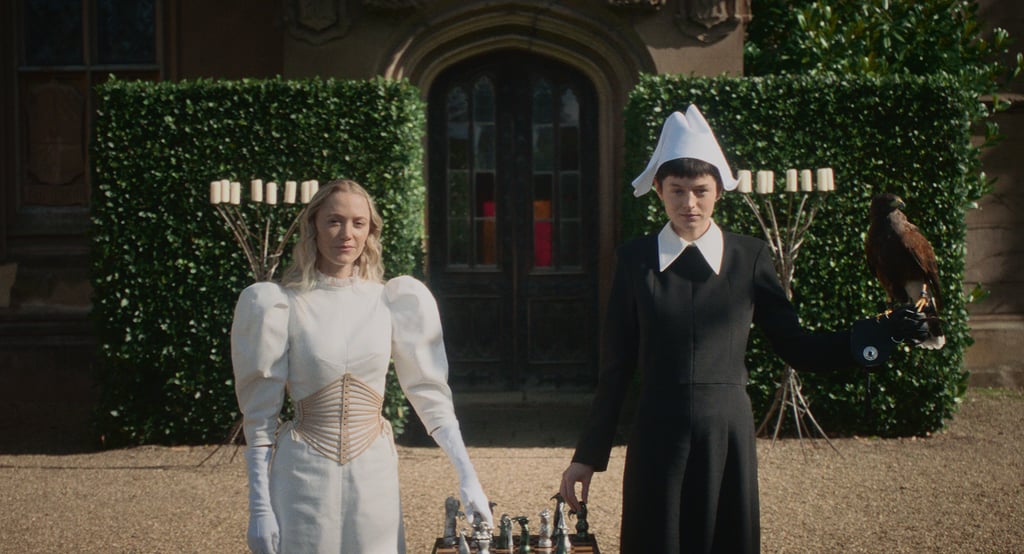100 Nights of Hero: A Bold, Queer and Feminist Fairy Tale
REVIEWS
Mia Pflüger
9/5/2025


Fairy tales have long been a cultural mirror, reflecting both societal ideals and entrenched hierarchies. For centuries, they trafficked in the trope of the passive princess: a delicate figure confined to towers or castles, waiting for a prince to rescue her, her fate largely determined by the whims of men. Julia Jackman’s “100 Nights of Hero“ gleefully dismantles this archetype. Adapted from Isabel Greenberg’s acclaimed graphic novel, the film transforms the structure and spirit of One Thousand and One Nights into a distinctly queer and feminist narrative, merging absurdist humor, romance, and sharp satire. In her sophomore feature, Jackman demonstrates a cinematic imagination that is both lavish and daring, offering a layered spectacle where storytelling itself becomes a revolutionary act.
The film opens in a fantastical medieval kingdom, at once familiar and otherworldly. Cherry (Maika Monroe) is trapped in a loveless and oppressive marriage to the cruel and arrogant Jerome (Amir El-Masry). Jerome’s hubris reaches comic and tragic extremes when he wagers not only his castle but also Cherry herself, confident that his friend Manfred (Nicholas Galitzine) can seduce her within a hundred nights.
Yet Cherry’s heart belongs elsewhere: to her witty and courageous maid, Hero (Emma Corrin). United in love and cunning, Cherry and Hero embark on a nightly storytelling scheme: each night, Hero weaves intricate, fantastical tales for Manfred, echoing the Scheherazade tradition from One Thousand and One Nights. These stories, layered within layers, form a narrative matryoshka that explores rebellion, sisterhood, and magic. By placing women at the center of narrative power, Jackman interrogates traditional myths, transforming storytelling into an act of resistance against patriarchal control.
Historically, One Thousand and One Nights has long been a complex text. Its origins trace back to multiple cultures across the Middle East, India and North Africa, reflecting a tradition of oral storytelling where cleverness, wit, and strategy often determine survival. Jackman’s adaptation retains this core, yet layers it with queer and feminist dimensions: Hero is not only clever but selfdetermining, her love for Cherry at the center of the narrative, and the stories she tells become an exploration of agency, identity, and collective empowerment. In doing so, the film joins a growing trend of contemporary cinema that reexamines canonical tales through progressive lenses, much like films such as “The Love Witch“ (2016) or “The Green Knight“ (2021), which interrogate gender, power, and myth.
At the heart of the film is Emma Corrin’s performance as Hero. Corrin embodies a character who is endlessly inventive, nimble, and emotionally layered, capturing the spirit of a trickster and visionary. Hero’s cleverness keeps both the audience and Manfred perpetually off-balance, transforming the act of storytelling into suspenseful theater. Maika Monroe’s Cherry grounds the narrative with vulnerability and gradual empowerment.
The arc from passive despair to assertive action resonates emotionally, giving weight to the fantastical layers surrounding the central romance. Nicholas Galitzine’s Manfred is deliciously sleazy, a figure both repellent and comically endearing, offering much of the film’s sharp humor. Felicity Jones, as the Moon, adds a mythic and reflective quality, her serene narration reinforcing the story’s folkloric tone and emphasizing the timeless power of storytelling itself. Jackman makes bold use of casting beyond conventional expectations. Pop icon Charli XCX appears briefly but memorably as a figure who exists in the liminal space between narrative and commentary. Her presence, though fleeting, highlights the performative nature of storytelling and underscores the interplay between narrative, identity, and spectacle. By blending these elements, Jackman asserts that storytelling is both an intimate act of survival and a public declaration of agency.
Especially, when it comes to the visuals “100 Nights of Hero“ is a feast. Shot at Knebworth House in Hertfordshire; a site renowned for its cinematic history; the film luxuriates in sweeping halls, candlelit chambers, and verdant forests. The production design blends medieval textures with contemporary flourishes, resulting in a world that is simultaneously rooted in history and timeless in its magical realism.
Costume design echoes this duality, combining period fabrics with modern silhouettes and accents, reflecting the fluidity of identity that the story itself celebrates. Oliver Coates’ electronic score eschews traditional orchestration, favoring pulsing rhythms and shimmering synths that propel the narrative and evoke a world that feels both ancient and vibrantly contemporary. The music, much like Hero’s tales, merges tradition with innovation, reinforcing the film’s thematic layers.
The film’s structure, while inventive, can be challenging. Its brisk 90-minute runtime houses numerous nested tales, which sometimes overwhelm or divert attention from the main arc. Tonal shifts - ranging from satire to tragedy to romance - can feel abrupt, and the bedtime-story framing occasionally interrupts the emotional continuity between Cherry and Hero. Moreover, some feminist messages are delivered with a directness that may leave little interpretive space. Yet these minor imperfections do not diminish the film’s energy, charm or political resonance. Jackman’s passion for storytelling is palpable and the joy infused throughout the film feels both celebratory and subversively political.
But ultimately “100 Nights of Hero“ is an immersive, imaginative, and politically resonant work. Its complex narrative, charismatic performances, lush visuals and evocative score coalesce into a cinematic experience that celebrates creativity, resilience, and female agency. Julia Jackman emerges as a major new voice in British cinema, unafraid to challenge tradition or embrace narrative eccentricity. The film may divide audiences with its unconventional rhythms and nested tales, but for those willing to surrender to its energy, it offers a story that delights, laments and ultimately affirms the power of women to shape their own narratives. In Jackman’s hands, fairy tales are no longer about waiting to be rescued - they are about claiming agency, loving boldly, and transforming the world through the art of storytelling.
